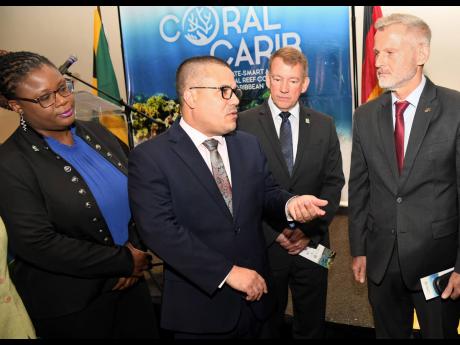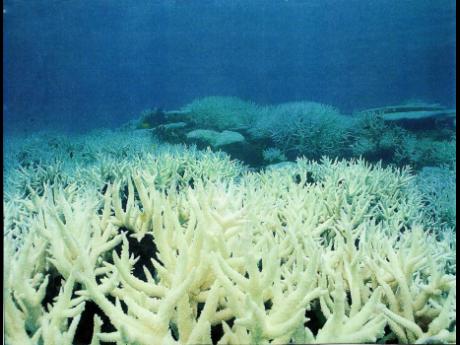Declarations good, but time for action
CoralCarib calls for urgent attention to rescue region’s reefs
Jamaicans have been challenged to start taking concrete action to mitigate and address climate change, given the severity of global problems associated with the issue.
German Ambassador Jan Hendrik van Thiel made the declaration as he urged the country to move beyond the signing of documents, including protocols, declarations, etc, at Tuesday’s launch of the CoralCarib Project, which calls attention to the alarming rate of deterioration of coral reefs.
“The situation is dire,” van Thiel told his audience at The Jamaica Pegasus hotel in St Andrew. “The glaciers are melting. The temperatures are rising not only in the air, but also in the sea. Weather patterns are getting erratic. We are in reaction mode all the time and also the sea is getting warmer, the coral reefs are bleaching.
“It is not time to sign declarations. Those are important, but it is now time for action,” van Thiel declared.
The degradation of coral reef ecosystems, which support fisheries, coastal protection, tourism and recreation revenue, threatens the future and livelihoods of the Caribbean’s 44 million people. The goal of CoralCarib is to improve marine diversity in 1,871 hectares of priority coral reef ecosystems in Cuba, the Dominican Republic, Haiti and Jamaica.
Coral reefs cover only about 0.2 per cent of the ocean floor, but support 25 per cent of marine life, with about a billion people out of the global population dependent on them for food and income.
The CoralCarib programme was guided by a new approach that uses scientific modelling on historic and future temperatures, hurricane impacts and the connectivity among corals, as well as local stakeholder input, to identify and prioritise climate refugia, where CoralCarib activities will take place.
Coral reef refugia are habitats which possess physical, biological and ecological characteristics that make them likely to be relatively resilient to future climate change. Direct project interventions are expected to reduce threats to coral reef ecosystems, leverage a significant amount of private and public finance for climate actions, support development of new policies, and create innovative tools and knowledge products to support coral restoration at scale.
Executive director of The Nature Conservancy Caribbean Division, Dr Rob Brumbaugh, said it would be easy to give up hope, given most of the recent headlines about reefs.
“However, when we look carefully, and scientists have done just that, corals are showing us that though they are down, they are not out. Corals are demonstrating something that we all appreciate in the wake of our recent pandemic history – the importance of resilience,” Brumbaugh explained.
“What is new is our ability to harness high-resolution scientific and geospatial data to predict with significant precision, the specific location where those climate-resilient reefs are located. When CoralCarib comes ... we expect to have improved marine diversity in 1,871 hectares of priority coral reef ecosystems in Cuba, Dominican Republic, Haiti and Jamaica.”
The Nature Conservancy is working with six regional partners across these four countries – Fundacion Dominicana de Estudios Marino and the Fundacion Grupo Puntacana of the Dominican Republic; Alligator Head Foundation, Jamaica; Acuario Nacional de Cuba, Cuba; and Haiti Ocean Project, and Initiative for Environment and Integrated Development in Haiti, both of Haiti.
Dr Brumbaugh explained that from the improved reefs, the project is expected to generate long-term socioeconomic benefits to coastal communities across the Caribbean. These include economically vibrant coastal tourism sectors supported by extensive natural beaches, marine ecotourism and fresh seafood.


